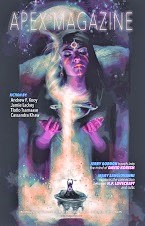 Apex Magazine #107, April 2018
Apex Magazine #107, April 2018
“Clap Your Hands” by Andrew F. Kooy
Reviewed by Jody Dorsett
The 107th issue of Apex has three original short stories. April, springtime, always seems to herald in a new beginning. It is a time for miracles of rebirth, of dead trees coming to life and flowers rising from the earth. This month Apex has selected stories that question whether such miracles are always good.
“Clap Your Hands” by Andrew F. Kooey
Five was born a murderer. His mother died when he was born and his father holds it against him. This is not unusual, often children are blamed for the ill that befalls their parents. That his father is an itinerant preacher is not unusual. Often people of faith can forgive a stranger but refuse to share such grace with their own family.
Into Five’s life miracles fall. Unexpected kindnesses happen. The author asks us to examine if we appreciate our blessings; the miracles that happen in our lives. Furthermore, the author ponders if all miracles are truly blessings.
“The Sharp Edges of Anger” by Jamie Lackey
We’ve all been told to “swallow your anger” or “let your anger go,” but what if anger manifested itself as an actual, physical item? In this story a girl grows up dealing with her anger in a very different way than do those around her. All the different ways people deal with anger become more palpable when anger is a physical object.
The author does a good job examining how people deal with their anger and how society expects, often unfairly, others to handle their own anger.
“Murders Fell from Our Wombs” by Tiotlo Tsamaase
The title, the first sentence, tells you what the story revolves around but not what it’s about. Game is a young girl from Bodibelampeng, Botswana. That the village is mired in poverty is readily believable to anyone who has seen Sally Struthers. One thing those commercials can’t convey is the smell of poverty and the feel of desperation in the air.
Name and her sister are plotting their life, like a movie script, in order to exit the village they live in. There is one obstacle to their going to university, every month someone is killed. The story examines more than the actual murders, it examines who is the real murderer. Is it the person who wields the knife? The victim who may or may not have called it on himself? The life of grinding poverty? Or is there a director moving the killers and victims as if they were on a movie set?
Reviewers Note: All of these stories are fine and worth reading. Yet I felt a bit disappointed because I had made the mistake of reading the editor’s description of this month’s offerings. I should have known better; short form fiction is great for taking an idea or an issue and examining it in a setting that accentuates the thing being discussed. Such as anger, blessings and why murder may happen. It is not good for developing the deep attachment to a character that would leave us “crushed” or “broken” at the end of the tale. Mr. Sizemore’s breathless descriptions do more harm than good, they set us up for disappointment.